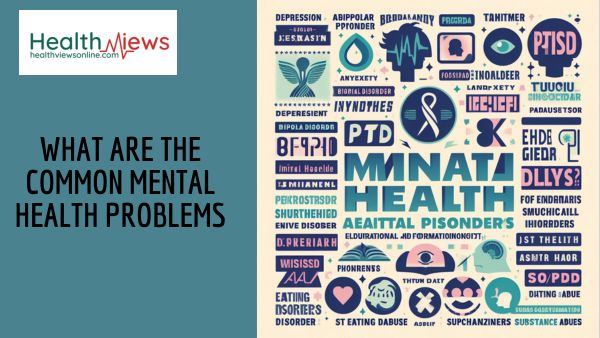A mental disorder is a clinically significant impairment in an individual’s cognition, emotional regulation, or behavior. In many cases, it leads to anxiety or functional impairment in important areas. Mental health problems are another name for mental disorders. There are various common mental health problems including anxiety and depression.
One out of every eight persons on the planet suffers from a mental condition. While there are useful prevention and treatment alternatives, many people with mental problems do not have access to them. Numerous people experience stigma, prejudice, and violations of their human rights. You will find here their symptoms, prevention, and care tips. (Source)
Also, Read Depression in Teens: 5 Signs Your Teen Might be Suffering from Depression
Top 10 Common Mental Health Problems with Symptoms, Prevention and Care Tips
1. Depression
Symptoms: Persistent sadness, loss of interest in activities, fatigue, changes in sleep and appetite.
Prevention: Maintain a healthy lifestyle, seek help from friends and family, and handle stress.
Care Tips: Maintain interaction, get more active, face your worries, avoid excessive alcohol consumption, eat a good diet, and establish a routine.
2. Anxiety Disorders
Symptoms: Excessive concern, restlessness, panic attacks, and physical symptoms such as sweating and trembling are all indications.
Prevention: Use stress management techniques, live a balanced lifestyle, and restrict caffeine consumption.
Care Tips: Therapy (e.g., cognitive-behavioral therapy), relaxation techniques, and medication when prescribed.
3. Bipolar Disorder
Symptoms: Symptoms include extreme mood swings between depression and mania (elevated mood), as well as impulsive behavior.
Prevention: Early detection and treatment, stress reduction, and medication adherence.
Care Tips: Mood stabilizers, therapy, and regular monitoring by a mental health expert are all alternatives.
Also watch: 7 Misconceptions About Bipolar Disorder You Need to Know Now
4. Schizophrenia
Symptoms: Delusions, hallucinations, disorganized thinking, and emotional flatness are some of the symptoms.
Prevention: Early intervention and treatment, minimizing substance abuse.
Care Tips: Antipsychotic drugs, therapy, and social support are all recommended.
Also Read: 10 Common Schizophrenia Myths you Need to Know Now
5. Post-Traumatic Stress Disorder (PTSD)
Symptoms: Flashbacks, nightmares, hypervigilance, avoidance of trauma reminders.
Prevention: Promote resilience and coping skills, through early trauma intervention.
Care Tips: Psychotherapy (e.g., trauma-focused cognitive-behavioral therapy), medication, and support groups.
6. Obsessive-Compulsive Disorder (OCD)
Symptoms: Intrusive, repetitive thoughts (obsessions) and ritualistic behaviors (compulsions).
Prevention: Identify and manage triggers, reduce stress, and seek early treatment.
Care Tips: CBT, exposure therapy, and medication if needed.
7. Eating Disorders (e.g., Anorexia, Bulimia, binge Eating)
Symptoms: Body image distortion, restrictive eating, binge eating, and purging behaviors are some of the symptoms.
Prevention: Encourage body positivity, teach about appropriate eating practices, and address issues of self-esteem.
Care Tips: Psychotherapy, nutritional counseling, and medical monitoring.
Also, watch health views web stories: 7 Super Foods to Boost Your Immune System
8. Attention-Deficit/Hyperactivity Disorder (ADHD)
Symptoms: Inattention, hyperactivity, impulsivity, difficulty focusing or completing tasks.
Prevention: Early detection, structure and routines, and behavioral techniques.
Care Tips: Medication (if prescribed), counseling, and skill-building strategies.
9. Borderline Personality Disorder (BPD)
Symptoms: Extreme mood swings, a shaky self-image, impulsive behavior, and a fear of abandonment.
Prevention: Early intervention and counseling, as well as emotional management skills.
Care Tips: Dialectical behavior therapy (DBT), medication for symptom control, and a strong support system
10. Generalised Anxiety Disorder (GAD)
Symptoms: Excessive concern, restlessness, muscle tension, and sleep difficulties.
Prevention: Stress management, relaxation techniques, and mindfulness practices.
Care Tips: Cognitive-behavioural therapy, medication when necessary, and self-help strategies.
Common mental health problems are prevalent, complicated, and profoundly affecting conditions that affect the lives of millions of people worldwide. We’ve looked at some of the most common mental health problems, such as anxiety disorders, depression, bipolar disorder, and schizophrenia, and shed light on their symptoms, causes, and potential therapies.
It is important to recognise that mental health is an important component of overall well-being, and the difference between physical and mental health is often blurred.





